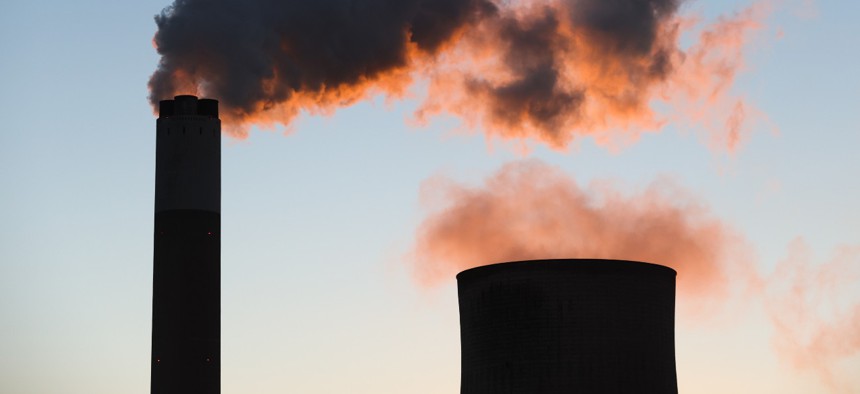
Republicans had questions about a proposed rule requiring federal contractors to report their greenhouse gas emissions. Chris Ratcliffe/Bloomberg via Getty Images
Proposed contractor climate change rule faces more questions from Republican lawmakers
House overseers demand a briefing from acquisition officials on the draft regulation requiring companies doing business with the federal government to report on their greenhouse gas emissions.
House oversight leaders are continuing their attacks against a proposed rule that would require federal contractors to disclose their greenhouse gas emissions.
The chairmen of the House Oversight and Accountability Committee and one of its subcommittees on Thursday sent a letter to the head of the Federal Acquisition Regulatory Council seeking information related to the November 2022 draft rule, which they said “extends the Biden administration’s radical environmental activism into federal government contracting.”
Specifically, Reps. James Comer, R-Ky., chairman of the committee, and Pat Fallon, R-Texas, chairman of the Subcommittee on Economic Growth, Energy Policy and Regulatory Affairs, expressed concern that the rule would restrict fuels available to the federal vehicle fleet and potentially hinder military readiness. They also said the rule would burden federal contractors with “ substantial and unreasonable costs to assess direct and indirect emissions.”
Additionally, the lawmakers argued the proposal would entrust a third-party international organization with unclear funding sources, a bias against the fossil fuel industry and ties to China with assessing contractors’ compliance with the emissions requirements and setting emissions reductions targets, raising questions about national security.
That organization–the Science Based Targets Initiative–is a partnership between the CDP, a nonprofit that helps businesses disclose their environmental impact; the United Nations Global Compact, to which the Chinese and other foreign governments make financial contributions; the World Resources Institute; and the World Wide Fund for Nature. The initiative provides information about its funding on its website.
“Delegating oversight functions to an entity supported by foreign governments, including China, raises serious concerns about the impact the rule would have on procurement for national security,” the lawmakers stated. They added: “SBTi’s stark opposition to the refining sector would prevent federal contractors from supplying ‘liquid fuels, such as jet and diesel, to power the military,’ including F-16 fighters, military cargo transport, and Black Hawk helicopters.”
The lawmakers asked the acquisition council to provide documents and communications with the three agencies that wrote the proposed rule (the Defense Department, General Services Administration and NASA) about the costs of the rule and its impact on military readiness and the federal vehicle fleet. The Republicans also wanted any correspondence between the acquisition council and SBTi related to the rule, as well as any communications with the Securities and Exchange Commission, which is developing its own related rule for publicly traded companies. They set an Aug. 10 deadline for a staff-level briefing.
The letter was addressed to Mathew Blum, head of the FAR Council and also administrator of the Office of Federal Procurement Policy. A spokesperson for the Office of Management and Budget, which houses the procurement policy office, said the administration had no comment on the letter.
The draft regulation on contractor disclosure of greenhouse gas emissions came out in November 2022. At the time, contracting groups and law firms with contracting practices noted that the rule could be costly and administratively burdensome to implement, and attract legal challenges. The SEC draft rule setting climate disclosure requirements for publicly traded companies has been beset by pushback from industry and delays.
Republicans on the House oversight committee have also tried to block the contractor disclosure rule legislatively. The Mission Not Emissions Act (H.R. 3358), which the House Oversight and Accountability Committee reported out last month, would prohibit requirements that contractors disclose greenhouse gas emissions or climate-related economic risks. Democrats on the committee did not support that bill.







